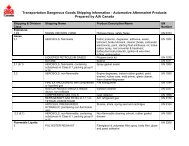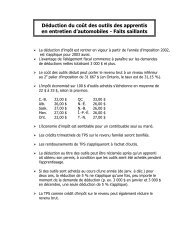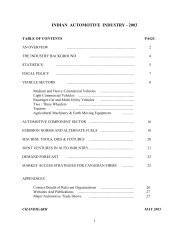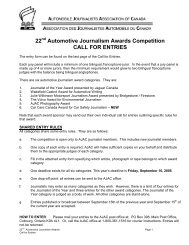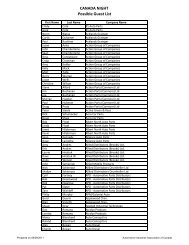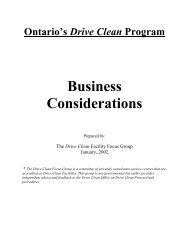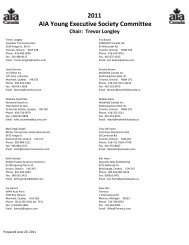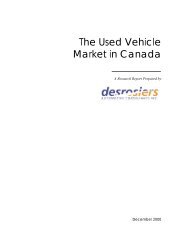Euro 5 Impact Assessment - Automotive Industries Association of ...
Euro 5 Impact Assessment - Automotive Industries Association of ...
Euro 5 Impact Assessment - Automotive Industries Association of ...
You also want an ePaper? Increase the reach of your titles
YUMPU automatically turns print PDFs into web optimized ePapers that Google loves.
The policy option would have some indirect impacts as well in terms <strong>of</strong> competitiveness.The automotive industry could become more competitive in markets outside the EU withstrict environmental regulation in force, through being able to produce vehicles equippedwith advanced environmental technologies. Moreover, it should be noted that at present,the EU is the world leader in diesel technology for light duty vehicles, whilst sales <strong>of</strong>diesels in Japan and in the US are minimal. A key reason for the limited sales in othermarkets relates to the higher pollutant emissions from diesel vehicles. They are unpopulareven though their CO 2 emissions are considerably lower than equivalent petrol vehicles.Cleaner diesel vehicles are therefore a necessary requirement for making diesel technologyviable in the parts <strong>of</strong> the world that use US or Japanese emissions standards. Encouragingthe development <strong>of</strong> cleaner diesel vehicle technology will have a positive impact on theinternational competitiveness <strong>of</strong> EU industry through expanding the size <strong>of</strong> the globaldiesel market and making <strong>Euro</strong>pean technology exportable to the rest <strong>of</strong> the world.Further development <strong>of</strong> EU emissions standards ensures their continued use in othermarkets around the world. At present there are three main systems used around the worldfor setting vehicle emission limits, these are those from the EU, the United States andJapan. Currently there is widespread use <strong>of</strong> EU standards in OECD countries such asAustralia and emerging markets around the world, including in China and India. As many<strong>of</strong> these markets have significant air quality problems and are experiencing high growth inthe use <strong>of</strong> cars, there is continued demand for better standards. Current high levels <strong>of</strong> oilprices and concerns over security <strong>of</strong> supply, is increasing the level <strong>of</strong> interest in dieseltechnology in a number <strong>of</strong> markets. So driving forward the development <strong>of</strong> cleaner dieseltechnology is an important need which could provide competitiveness benefits. Thereforefurther evolution <strong>of</strong> EU policy in this area, will sustain the use <strong>of</strong> the <strong>Euro</strong> system so be inthe interests <strong>of</strong> both EU based manufacturers and equipment suppliers.Finally, a policy that makes it necessary to develop and introduce new environmentaltechnologies would benefit indirectly the component suppliers in the automotive industry,who would benefit from increasing revenues.• Affordability <strong>of</strong> carsThe necessary technological developments will result in an increase in consumer prices <strong>of</strong>new vehicles, which would negatively affect consumers in the <strong>Euro</strong>pean Union. However,consumers would also benefit from the proper functioning <strong>of</strong> the internal market indirectlythrough greater competition between manufacturers and the reduction in barriers to crossbordervehicle purchases.5.1.2.2. Environmental impacts• Air qualityThe policy option would result in improvement in air quality through reducing the levels<strong>of</strong> pollution produced by road transport. A decrease in the areas under threat <strong>of</strong> ozone andeutrophication would be a result <strong>of</strong> reduced air pollution from vehicles. Furthermore,cleaner air in cities would also reduce damage to buildings and cultural heritage.• Biodiversity14



